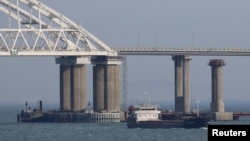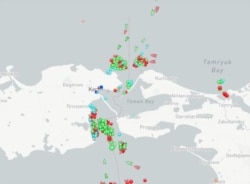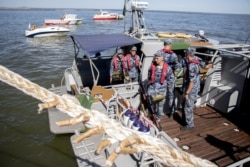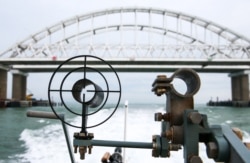On December 10, Russian state media reported that a Ukrainian naval vessel had left Ukraine’s Port of Mariupol and was moving toward the Kerch Strait, which links the Black Sea and the Sea of Azov.
Russia’s Federal Security Service (FSB) claimed the Ukrainian Navy command ship Donbas had endangered navigation and acted provocatively by sailing “close to Russian waters, without permission,” and refusing to change course, Russian state broadcaster RT reported.
“The ship did not have permission to pass through the strait and did not respond to commands to change its course, the FSB said, adding that the Ukrainian vessel was being closely tracked by a Russian Coast Guard ship,” RT reported.
Afterwards, the ship reportedly turned back.
In fact, the Ukrainian vessel did not need Russia’s permission to sail through the Kerch Strait.
Following its illegal annexation of the Ukraine’s Crimean peninsula in 2014, Russia has at times enforced a blockade of the Kerch Strait, which Chatham House, a London-based think tank, called “a chokepoint of regional significance.”
Polygraph.info has previously covered this issue. But it arises now as Russia masses nearly 100,000 troops along Ukraine’s north, east and southeast borders in what Ukraine, the U.S. and European allies fear is a prelude to an invasion.
In summary, a 2003 bilateral treaty, the “Agreement Between the Russian Federation and Ukraine on Cooperation In The use of The Sea of Above and the Kerch Straight,” states that “[t]he Sea of Azov and the Kerch Strait are historically inland waters of the Russian Federation and Ukraine.”
Article 2 of the treaty states: “Merchant ships and warships, as well as other state ships flying the flag of the Russian Federation or Ukraine, operated for non-commercial purposes, enjoy freedom of navigation in the Sea of Azov and the Kerch Strait.”
Also, the Sea of Azov is an inland, semi-enclosed body of water. That means it is governed by Article 123 of the United Nations Convention on the Law of the Sea (UNCLOS).
Article 123 calls on states bordering an enclosed or semi-enclosed sea to “cooperate with each other in the exercise of their rights and in the performance of their duties under this Convention.”
Article 19 of UNCLOS, which provides for innocent passage, allows foreign ships, even military vessels, to pass through the territorial waters of another state so long as that passage is “not prejudicial to the peace, good order or security of the coastal state.”
Still, as Polygraph.info previously noted, flaws in the 2003 bilateral treaty leave space for ambiguity.
Vladimir Socor of the Jamestown Foundation wrote in 2018 that the treaty makes “no reference to general international law, nor to the United Nations Convention on the Law of the Sea.”
The 2003 agreement also called on the two sides to draw up a separate agreement that would determine the Sea of Azov’s borders.
That never happened, and, according to a 2018 analysis by Mykhailo Samus, deputy director for international issues at Ukraine’s non-governmental Center for Army, Conversion and Disarmament Studies, Russia used the resulting legal vacuum to “independently determine such borders.”
However, despite that lack of clarity on the status of the Sea of Azov and Kerch Strait, much of Russia’s claim rests on its annexation of Crimea, which the United Nations has not recognized.
In March 2014, the United Nations General Assembly adopted Resolution 68/262, which upholds Ukraine’s territorial integrity, including Crimea.
So, even with the flawed 2003 treaty, Moscow’s attempts to claim the Sea of Azov based on its illegal occupation of Crimea are unsupported.
Meantime, legal analysts have posited that the Kerch Strait and Sea of Azov are either internal waters of Russia and Ukraine, forming part of a “single bay regime,” or “largely are part of the territorial sea of Ukraine and Russia.”
Moscow, they say, has no unilateral right to restrict innocent passage. But that has not stopped Russia from attempting to establish control over the region.
In November 2018, FSB border patrol boats captured three Ukrainian vessels and 24 sailors after firing on them.
The Ukrainian foreign minister at the time, Pavlo Klimkin, said Russia’s actions violated Articles 38 and 44 of UNCLOS, which “clearly and strongly bans the obstruction of peaceful transit across the Kerch Strait,” the BBC reported.
In May 2019, a U.N. Maritime Tribunal called on Russia to immediately release the Ukrainian sailors. Moscow refused to accept the tribunal’s jurisdiction in the matter, but later released the sailors under a prisoner swap.








